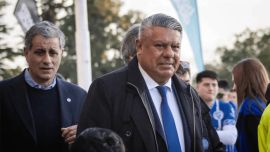The die is cast for Sunday's PASO primaries with close races and uncertainty in the main districts. At stake for the government is retaining its Senate majority and winning the eight seats necessary for a majority of Deputies, which the opposition naturally seeks to avoid. Meanwhile, both are unrolling their presidential projects for 2023.
Within a generally mediocre campaign lacking any strong or innovative proposals and falling under a polarisation pushed by marketing, there are two models in play, each one with its own aims. To which could be added a third anti-political sentiment, but that would still be premature although the greater social apathy towards the political leadership is helping to install it.
Some considerations before moving to the numbers. Apart from the dispute for seats and majorities, this election is the start of the 2023 presidential race for at least three forces.
If the government wins, Alberto Fernández stands poised to seek re-election. If it loses, it will surely be doomed to a shift in the direction of hard-core Kirchernism with others in the running for the top job.
On the Juntos side, Buenos Aires City Mayor Horacio Rodríguez Larreta will be seeking a clear win on his own turf while running strongly in Buenos Aires Province to consolidate his presidential ambitions and confirming his hegemony within PRO. There he faces a Radicalism driven by the figure of Facundo Manes with presidential dreams of his own.
It’s no coincidence that there has been friction in the Buenos Aires Province campaign with the neurologist seeking to distance himself from the errors of the Cambiemos government, aiming for the middle ground and reviving the Radical mystique of the middle class.
The third possibility, still premature, is the “anti-establishment” party Avanza Libertad headed by the outsider Javier Milei. This kind of party, analysed in detail by political scientist Andreas Schedler, is reflected in Europe by the likes of Marine Le Pen in France, Vox in Spain or AfD in Germany.
For now, the consultants are showing them to be competitive enough to win a seat in both City and Province. With the results both the seriousness and the scale of their pretentions may be seen.
Close nationwide and main districts uncertain
Turning to the numbers, consultants are forecasting parity with a low turnout and nobody reaching 40 percent. Frente de Todos and Juntos por el Cambio (Juntos in some districts) continue to concentrate the most attention in a scenario of difficult installation for third parties.
Analysts like Carlos Pagni make an interesting comparison with the late 1980s when the right was on the rise with the UCEdÉ. Today this can be seen in two expressions. One is Alianza por la Libertad, an anti-establishment party headed by Javier Millei in this City. His acceptance among youth is striking although to know its real scale the final numbers must be awaited.
The other surprise along these lines is Ricardo López Murphy, who should clear the threshold to be part of the final list (with a minor conflict because definition by the D´Hondt system and respect for gender equality might force him to drop a slot in favour of Sandra Pitta). The phenomenon of the “Bulldog” has acquired more force from his candidacy not being as successful as thought. Although it is estimated that he could win the primary, it will not be by a big margin (topping 40 percent) as some believed.
In this City a total of 13 seats are at stake with 10 on the line for Juntos. To hold them they need to top 60 percent of the votes, something which at this stage seems impossible. While a scenario of triumph is highly probable, it would most likely suffice to hold eight seats.
It’s always uphill in this district for Kirchnerism, making the candidacy of an ex-Radical like Leandro Santoro, who can pick up some progressive non-Peronist votes dissatisfied with the City Mayor, a wise choice. His floor is 25 percent and his aim (seconded by Gisela Marziotta) would be to hold the 31 percent won in 2019 with the Alberto Fernández effect.
The Radicals headed by Adolfo Rubinstein are seeking to clear the internal threshold of their coalition (15 percent) to make the list for the midterms.
In Buenos Aires Province (electing a total of 35 deputies) the list headed by Victoria Tolosa Paz and Daniel Gollán would need to reach 40 percent to hold their 17 seats at risk (13 won by the Civic Union and four by the Renewal Front of Sergio Massa subsequently joining Frente de Todos) while Juntos por el Cambio should be able to hold their 14 seats at stake if they reach 30 percent.
One detail to bear in mind is that there is no linear transfer of votes from the PASO primaries to the midterms. This means paying attention to the fact that the votes obtained by Manes will not pass in their totality to Diego Santilli (and vice versa too), more than anything because the Radical commands a sector of the electorate dissatisfied with both PRO and Kirchnerism.
The work of unity prior to the midterms will thus pay attention to healing wounds, hence the value attached to the Sunday photo between the two rivals.
Another detail of this primary is that, unlike PASO as a whole, the list will not be defined by the D´Hondt system but by the percentages obtained within the coalition. But the first and third places are reserved for Santilli or Manes, depending on who triumphs.
The Radicals are clearly playing for more protagonism in the face of the presidential aspirations of Rodríguez Larreta.
The panorama is complex for third parties with a slight advantage for Florencio Randazzo. Here it should be borne in mind that PASO lends itself to protest voting. Another beneficiary riding a liberaloid wave is José Luis Espert with a more centrist discourse than Millei but rooted in the same electorate – anti-Kirchnerites also disappointed with Juntos who seek an alternative more to the right.
More cases with tight scenarios
Santa Fe is one of the few provinces where Frente de Todos is running split. The list backed by Vice-President Cristina Fernández de Kirchner and Governor Omar Perotti is headed by Marcelo Lewandoski and María de los Ángeles Sacnun at senatorial level, confronting former Defence minister Agustín Rossi, paradoxically a Kirchnerite, linked to a group of provincial senators. Some opinion polls show the ex-minister to be winning out, thus increasing the uncertainty for the midterms.
Juntos por el Cambio is presenting four lists, headed by Federico Angelini with Amalia Granata, by Carolina Losada, by Maximiliano Pullaro and by José Corral.
Córdoba will be another interesting race. Anti-Kirchnerite territory par excellence, Peronist Governor Juan Schiaretti, who has placed his wife and current deputy Alejandra Vigo as his first senatorial candidate, has scant probabilities of triumph. His line is distanced from Kirchnerism which is seeking the re-election of current Senator Carlos Caserio.
A Juntos por el Cambio victory is thus highly probable with two Radical lines facing off in the primary. One has Mario Negri running for the Senate with Macri backer Gustavo Santos while the other has Rodrigo De Loredo aspiring to a lower house seat aligned with Luis Juez as a senatorial candidate. Negri and Juez both have their eye on becoming governor in two years’ time.
Finally, one case worth following is Chubut, mainly because all three of its current senators respond to Cristina. None are running for re-election and for the first time the opposition has serious chances of picking up seats. In a Management & Fit survey of voting intentions, Frente de Todos obtained 23.1 percent; Juntos por el Cambio 18.3 percent and Chubut Somos Todos 7.7 percent with 23.2 percent for all other parties and 20.9 percent undecided.


























Comments